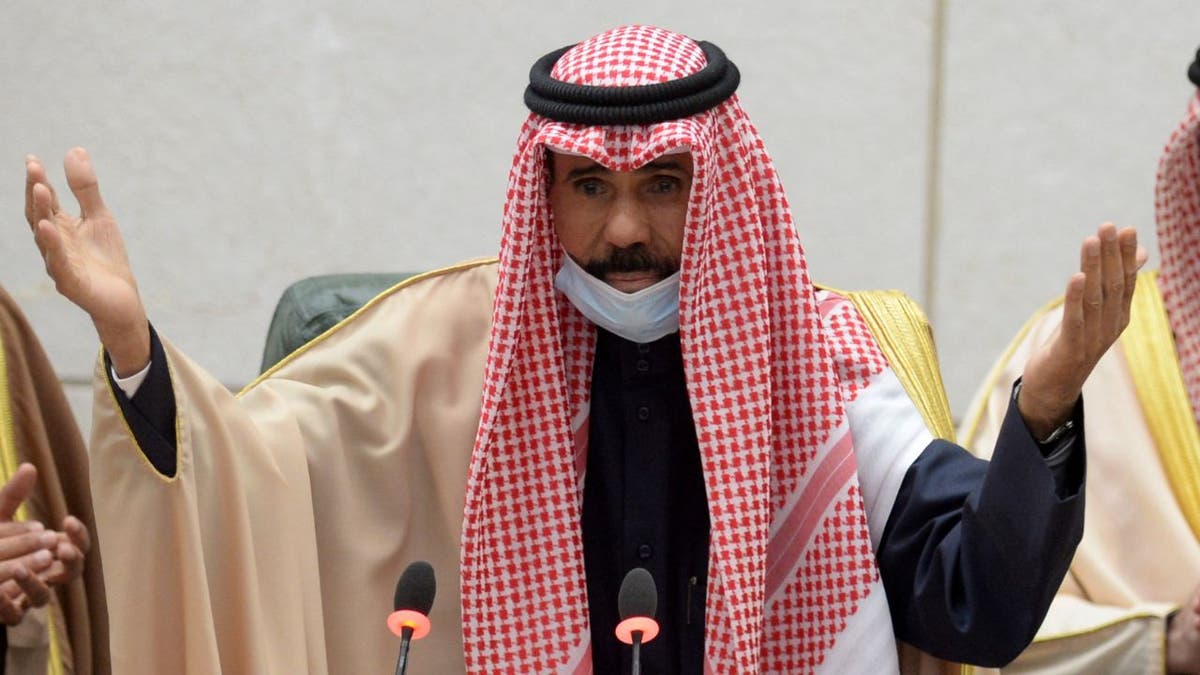
The ruling emir of the oil-rich nation Kuwait, Sheikh Nawaf Al Ahmad Al Sabah, has died at the age of 86, just over three years after assuming power, Kuwaiti state TV announced.
His cause of death has not been revealed although the ruling emir was hospitalized last month ‘due to an emergency health problem’ but was later reported to be in stable condition.
The small Mideast nation, which is the holder of the world’s seventh-largest oil reserve, borders Iraq to the north and Saudi Arabia to the south, has seen internal power struggles behind palace doors.
Kuwait state television broke into programming with Quranic verses just before a somber official made the announcement.
‘With great sadness and sorrow, we — the Kuwaiti people, the Arab and Islamic nations, and the friendly peoples of the world — mourn the late His Highness the emir, Sheikh Nawaf Al Ahmad Al Jaber Al Sabah, who passed away to his Lord today,’ said Sheikh Mohammed Abdullah Al Sabah, the minister of his emiri court, who read the brief statement.
State-run news previously reported that he had traveled to the United States for unspecified medical checks in March 2021.
Sheikh Nawaf was named crown prince in 2006 and became emir in September 2020 following the death of his brother, Sheikh Sabah, who had ruled for more than a decade and shaped the state’s foreign policy for over 50 years.
Sheikh Nawaf was the nation’s defense minister when Iraq invaded and occupied Kuwait in 1990, sparking the beginning of the first Gulf War. Kuwait has been a strong U.S. ally since then.
Since he took over in 2020, Sheikh Nawaf has maintained a foreign policy that balanced ties with those neighbors, whilst domestically, eight governments were formed under his rule.
Sheikh Nawaf’s term was focused on domestic issues as the nation struggled through political disputes — including the overhaul of Kuwait’s welfare system — which prevented the sheikhdom from taking on debt. That policy left it with little in its coffers to pay bloated public sector salaries, despite generating immense wealth from its oil reserves.
In 2021, Sheikh Nawaf issued a long-awaited amnesty decree, pardoning and reducing the sentences of nearly three dozen Kuwaiti dissidents in a move aimed at defusing a major government standoff. He issued another just before his illness, aiming to resolve that political impasse that also saw Kuwait hold three separate parliamentary elections under his rule.
Crown Prince Sheikh Meshal al-Ahmad al-Sabah, 83, who has been Kuwait’s de facto ruler since 2021, when the frail emir handed over most of his duties, is the designated successor. He is Sheikh Nawaf’s half-brother.
Kuwait has a population of around 4.5 million people, of which 1.45 million are Kuwaiti citizens. The remaining 3 million are foreign nationals from more than 100 countries.
Meanwhile, Egypt has declared three days of mourning over the passing of Sheikh Nawaf, according to Sky News Arabia.

The ruling emir of the oil-rich nation Kuwait, Sheikh Nawaf Al Ahmad Al Sabah, has died at the age of 86, just over three years after assuming power, Kuwaiti state TV announced.
His cause of death has not been revealed although the ruling emir was hospitalized last month ‘due to an emergency health problem’ but was later reported to be in stable condition.
The small Mideast nation, which is the holder of the world’s seventh-largest oil reserve, borders Iraq to the north and Saudi Arabia to the south, has seen internal power struggles behind palace doors.
Kuwait state television broke into programming with Quranic verses just before a somber official made the announcement.
‘With great sadness and sorrow, we — the Kuwaiti people, the Arab and Islamic nations, and the friendly peoples of the world — mourn the late His Highness the emir, Sheikh Nawaf Al Ahmad Al Jaber Al Sabah, who passed away to his Lord today,’ said Sheikh Mohammed Abdullah Al Sabah, the minister of his emiri court, who read the brief statement.
State-run news previously reported that he had traveled to the United States for unspecified medical checks in March 2021.
Sheikh Nawaf was named crown prince in 2006 and became emir in September 2020 following the death of his brother, Sheikh Sabah, who had ruled for more than a decade and shaped the state’s foreign policy for over 50 years.
Sheikh Nawaf was the nation’s defense minister when Iraq invaded and occupied Kuwait in 1990, sparking the beginning of the first Gulf War. Kuwait has been a strong U.S. ally since then.
Since he took over in 2020, Sheikh Nawaf has maintained a foreign policy that balanced ties with those neighbors, whilst domestically, eight governments were formed under his rule.
Sheikh Nawaf’s term was focused on domestic issues as the nation struggled through political disputes — including the overhaul of Kuwait’s welfare system — which prevented the sheikhdom from taking on debt. That policy left it with little in its coffers to pay bloated public sector salaries, despite generating immense wealth from its oil reserves.
In 2021, Sheikh Nawaf issued a long-awaited amnesty decree, pardoning and reducing the sentences of nearly three dozen Kuwaiti dissidents in a move aimed at defusing a major government standoff. He issued another just before his illness, aiming to resolve that political impasse that also saw Kuwait hold three separate parliamentary elections under his rule.
Crown Prince Sheikh Meshal al-Ahmad al-Sabah, 83, who has been Kuwait’s de facto ruler since 2021, when the frail emir handed over most of his duties, is the designated successor. He is Sheikh Nawaf’s half-brother.
Kuwait has a population of around 4.5 million people, of which 1.45 million are Kuwaiti citizens. The remaining 3 million are foreign nationals from more than 100 countries.
Meanwhile, Egypt has declared three days of mourning over the passing of Sheikh Nawaf, according to Sky News Arabia.














